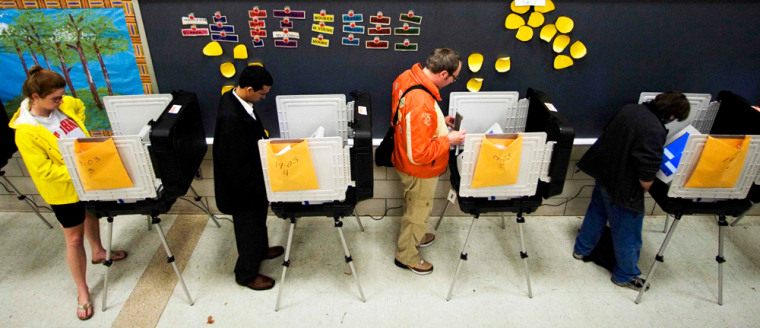Young Americans can finally shake off their reputation for civic apathy. Young people appear to have voted in higher numbers than ever before, preliminary reports show. And analysts say this demographic’s heavy tilt toward Barack Obama was a determining factor in his historic victory.
An estimated 24 million Americans ages 18 to 29 voted in this election, an increase in youth turnout by at least 2.2 million over 2004, reports CIRCLE, a non-partisan organization that promotes research on the political engagement of young Americans. That puts youth turnout somewhere between 49.3 and 54.5 percent, meaning 19 percent more young people voted this year than in 2004, estimates John Della Volpe, the director of polling for the Harvard Institute of Politics. And that’s a conservative estimate, Della Volpe says.
“It looks like the highest turnout among young people we’ve ever had,” says Della Volpe, adding that 12 percent more Americans in the overall electorate voted. The youth share of the vote also rose to 18 percent — a one-percent increase over the last three presidential elections.
“But I think one of the biggest stories is not so much the turnout but the balance of Obama versus McCain among young people — it’s pretty extraordinary,” says Peter Levine, the director for CIRCLE.
Exit polls show 66 percent of voters ages 18 to 29 preferred Obama and 32 percent preferred McMain. The gap closed among those ages 30 to 44 who preferred Obama 52 percent to McCain’s 46 percent. Among those ages 45 to 64, the vote was fairly evenly split between the candidates. Fifty three percent of voters 65 and older leaned toward McCain, compared to 45 percent who supported Obama.
“The reason he won the majority (of the overall vote) was the strong showing from voters 18 to 29. If you subtracted some of their turnout, or if you raised the voting age to 21, it’s a much closer race — or maybe he loses.”
'Driving force'
Della Volpe estimates that Obama won the youth vote by 8.3 or 8.4 million — and he won the overall popular vote by about 8 million.
“Young people, no question, were the driving force behind this election,” Della Volpe says.
In North Carolina, Obama won the youth vote by nearly 50 points, with 73 points over John McCain’s 27. He lost every other age group in that state. “That turned the state from red to blue,” Della Volpe says. (NBC News has not yet projected a winner in the close presidential race in North Carolina.)
That same kind of wide margin also applied to Indiana, where he won the youth vote 63 to 35 — and again, lost every other age group. “And this is a state where John Kerry lost the youth vote in 2004,” says Della Volpe. Overall, Obama won 4 1/2 times the number of youth votes Kerry won in 2004.
“The difference is the margins — that’s what Obama deserves credit for,” Della Volpe says. “Young people were going to turn out anyway. He took that passion, that excitement, and really mobilized it.”
For Democratic party or only Obama?
Historically, young voters have never before been so solidly united under a single party, says Levine. In fact, the trend for years — here in the U.S. and internationally — has been for younger voters to consider themselves more independent. The question now is: Was it truly a tilt toward the Democratic party, or did the excitement belong solely to Obama?
“Young people have in at least the last 10 years have been pretty resistant to identify with any party,” Levine says. “I think it’s an open question whether Obama will try to and whether Obama will succeed in translating his support to the party.”
There is a possibility that these young people will continue to align themselves with the Democratic party. A comparable election is when Ronald Reagan was elected in 1984, gaining a large chunk of the youth vote; most of those young people continued to consistently vote Republican decades later.
This election season seems to have seen a surge in young people eager to immerse themselves in political involvement, perhaps especially those involved in campaigning efforts for Obama. Sarah Crisman of Dallas, 29, has spent the better part of the last 19 months devoted to the Obama campaign. And now that the election is over, she doesn’t plan to stop her volunteer efforts.
In February 2007, Crisman joined what was then a 100-person meet-up group for Obama, which by Election Day had ballooned into Obama Dallas, a 7,500-person strong grassroots volunteer organization to help campaign for the now president-elect. At an election party Tuesday night, the group’s leaders announced that the organization had a new name: The Progressive Center of Dallas.
“We're not just going to twiddle their thumbs; we’re going to stay together, we’re going to keep moving, we’re going to keep working,” Crisman says. “It’s not over. This has changed my life; I’m not going to let this die out.”
